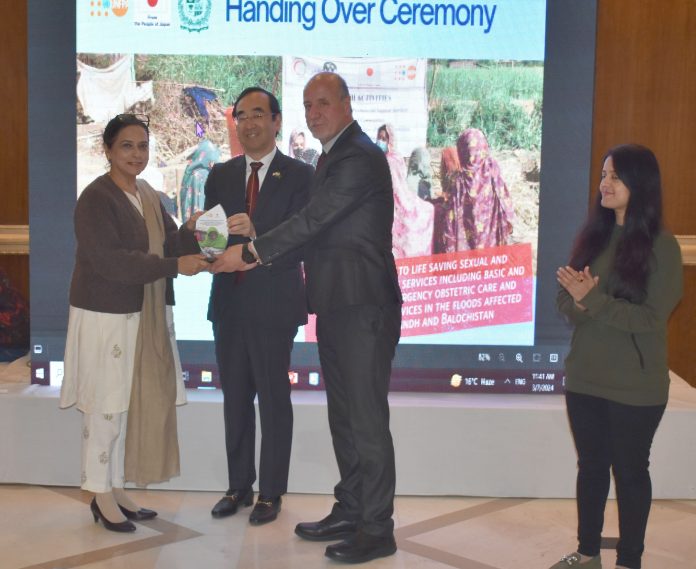Saifullah Ansar/DNA
ISLAMABAD: UNFPA and the Government of Japan have successfully completed a collaborative project of expanding the life-saving emergency interventions to meet the needs of women and girls in seven districts, of Sindh and Balochistan, which were badly impacted by the 2022 floods.
Government of Japan provided the generous support of 1.85 million US$ to UNFPA to reach the most vulnerable women and girls in areas where services and infrastructure of health and protection were damaged. The initiative focused on providing lifesaving sexual and reproductive health services and survivor-centred gender-based violence mitigation and response services to women and girls. The project was implemented in Qambar Shahdadkot, Naushahro Feroz, Khairpur, Larkana and Dadu districts in Sindh and Lasbela and Jhal Magsi districts in Balochistan.
Speaking at the closing ceremony, H.E. Wada Mitsuhiro, Ambassador of Japan, said ‘With the infrastructure damaged and health services disrupted, we recognized the situation was dire for pregnant women and risks of gender-based violence were increasing. We, the Government of Japan, thus prioritized lifesaving sexual and reproductive healthcare services for pregnant women and gender-based violence prevention in the flood affected areas. The government of Japan is committed to ensuring women’s human rights and fighting against all forms of gender-based violence. Women, Peace and Security (WPS) is a fundamental pillar for sustainable development.’
Addressing the audience, Dr. Luay Shabaneh, UNFPA Representative said ‘The floods were catastrophic and badly impacted the private life of women and girls including those who were pregnant or with disabilities. Women bear the brunt of disasters and are the last to receive the assistance. In most responses, the focus remains on shelters and food and the silent suffering of women and girls remains invisible. We acknowledge and appreciate the support of the Government of Japan through which the priority was given to the most urgent needs of women and girls.’
Chief Guest of the ceremony, Dr. Sabina Durrani, Director General, National Health Emergency Preparedness & Response Network said ‘Pakistan and the Government of Japan has a long standing relationship. Japan has always been there for Pakistan in times of crisis and emergencies. Pakistan is also a disaster-prone country and therefore we must take a proactive approach to invest in preparedness and resilience. This will reduce the spending on response.’ She also appreciated the support provided by UNFPA to the government of Pakistan on maternal health and family planning.
Under the project, twelve Women and Girl’s Friendly Spaces (WGFS) were established to provide women and girls with psycho-social support and referrals for protection services. Thirty-seven health facilities were supported with equipment and commodities to help continue the essential sexual and reproductive health services. This enabled safe deliveries of more than 15,000 babies and provision of contraceptive commodities to more than 50,000 women. Almost 450,000 people were reached with information on health services, gender-based violence and family planning. Women dignity kits and new born baby kits were also distributed.

















